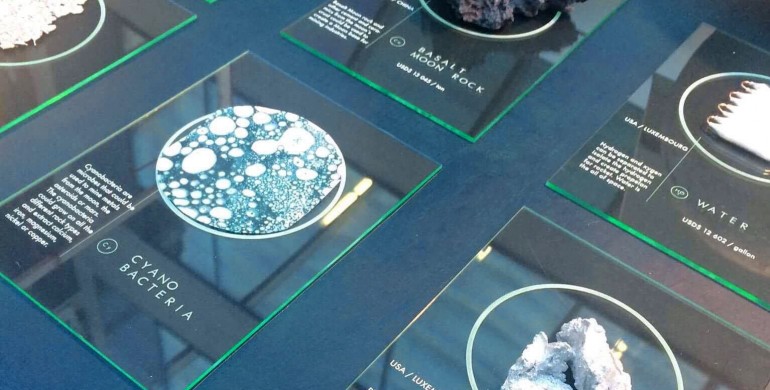Terra Fiction Lab: Worldbuilding
By: Pippa Goldschmidt, Tivon Rice, Klaas Kuitenbrouwer & Sjef van GaalenThe Terra Fiction Lab will focus on the narrative development of a new 21st-century eco-society, and will lead to a small collection of written or visualized speculative short stories in collaboration with The New Institute
Date: 28 & 29 September 2018 | Time: 10:00 – 17:00
Location: Waag Society | Nieuwmarkt
Target audience: writers, visual artists, designers, (game) developers, creative coders, social scientists, biologists, ecologists
Capacity: 20
<<APPLY HERE>>
How will future environments function and what will they look like? What new links can be envisioned between human, technology and ecology on earth or in outer space? The Terra Fiction Lab, organised in close collaboration with The New Institute, will focus on the creation of short stories and narrative design concepts that can function as standalone artistic products or the start for new installations or performances.
In two days participants will create narratives (short stories, prototypes or short videos) that give access to a world where new relationships between landscape, space, technology and humans are envisioned. The aim is to imagine existence in a postcapitalist world with an economic system that is not based on exploitation and extractivist practices: a 21st-century society that will be less human-centered with organisms, landscapes, machines emancipated alongside humans, on earth or elsewhere. ;Worlds where ecologies are regenerated by new alliances between humans and plants. How does such a world look? What kind of stories and imageries can help us envision such a world?
In this lab FIBER employs the practice of Worldbuilding, a narrative technique that comes from Science Fiction writing and Transmedia storytelling. Examples of famous worldbuilders are Alex McDowell, Kim Stanley Robinson (The Mars Trilogy), J.R.R Tolkien (Lord of the Rings) and Ursula Le Guin. In interdisciplinary teams of maximal 5 people the participants will work on building such a narrative world. Lead by three lab leaders (a sci-fi writer, a designer and an artist-developer) the participants will get access to a variety of tools and outcomes that can be used as ingredients to build their worlds. The outcome of the lab consists of short stories and/or images and clips.
Tentative Outline
Day 1:
- Introduction lab leaders and participants
- Introduction goals, programme and processes
- Short recap of earlier labs by Klaas Kuitenbrouwer & Sjef van Gaalen
- Masterclass sci-fi short story writer Pippa Goldschmidt on Worldbuilding
- Lunch & creating an index of the participants interests
- Share ideas to form groups around similar/shared interests & topics
- Research, sketch, write and assembly of elements for worldbuilding
- Presentation and feedback of concept
Day 2:
- Welcome to day 2
- Presentation Tivon Rice – Machine learning and assisted narrative design
- Worksession: write and visualise
- Feedback intermezzo: share work-in-progress + feedback
- Worksession: write and visualise
- Open Lab: End presentations – beers and short presentations of work-in-progress
Preparation & background
Participants will be asked to prepare by thinking of which topic(s), plot, character (human/non-human), technology they like to use in the construction of their narrative space/world. The lab is co-organised by Het Nieuwe Instituut and Border Sessions.
Inspiration:
https://futureofstorytelling.org/video/alex-mcdowell-world-building
Prior Lab Sessions:
Note that you did not need to attend these labs to participate at the Worldbuilding Lab.
- Lab 1: Terraforming Earth Labs: Constitution of a 21st Century Society
The premise of the Terrafroming Earth programme is that political and economic systems should be conceived and designed in a radically different way in order to create an environment for a society of plants, animals, people and machines to sustain itself and to thrive. A first major hurdle to this development is the widespread, almost metaphysical conviction labelled ‘capitalist realism’ by Mark Fisher, summarized in the statement: “It is easier to imagine the end of the world than the end of capitalism.” Is there a plausible way to conceive of a parallel economic system not based on exploitation and extractivist practices?
The goal of this Lab was to explore the potential of the notion of ‘legal person’ to incorporate non-humans. All current constitutions are formulated around the basic right and obligation-holding unit of the ‘natural person’, which is based on the human individual. If we accept that a 21st-century society will be less human-centred, this central idea of the natural person will need to be re-considered.
Report: https://research-development.hetnieuweinstituut.nl/en/research-projects/report-lab-1-constitution-21st-century
Talk The Jaymo https://www.youtube.com/watch?reload=9&v=-kgrwUmdV2A
- Lab 2: Autonomous Agents for Regenerative Ecologies
Landscape degeneration is a phenomenon at planetary scale. Some see this century as the age of ecological regeneration; bringing areas back to life, with the return of water, vegetation and all manner of organisms re-appearing. This would be ‘The Great Work’ for humanity. But are humans best suited for all aspects of this task? Could landscapes engage in self-regeneration if they form alliances with the right technologies? What would such systems entail? This lab proposes to push the narrative beyond human-centric perspectives. At Border Session the participant will collaborate to discover and build a unique perspective on tech-enabled autonomous ecologies.
Report: https://research-development.hetnieuweinstituut.nl/en/report-terraforming-earth-lab-2-autonomous-agents-regenerative-ecology
Image: Scrambling For The Moon (2017), Margaux Hendriksen
